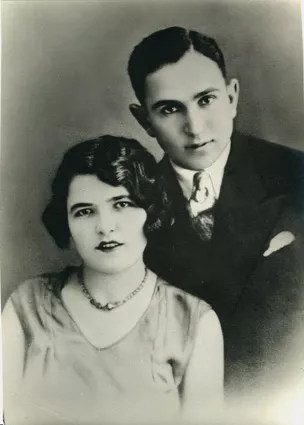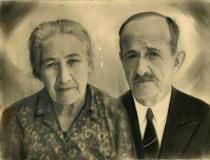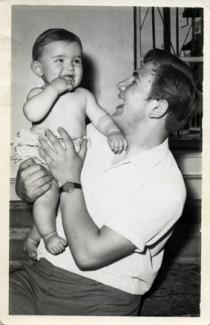My father and my mother
This photograph was taken in 1932 in Edirne. The people in these photograph are my father and my mother. I do not have a particular memory with this photograph.
My father Yasef Ozlevi was born in 1907 in Edirne, 1323 in the old calendar [Muslim calendar]. His mother tongue was Judeo-Spanish and Turkish, he also spoke French well. He dropped out the last year of Alliance 2 school, that is to say the first year [class numbers went from higher numbers to smaller ones, so grade 1 was the senior year]. If he hadn't dropped out of Alliance, they were about to send him to Paris, so he could study there and have an occupation. But my grandfather said: "why should I send him there, I will give him a gold bracelet" and took him under his wing.
Later on my father worked with my grandfather until my grandfather reached the age of 55 and decided to retire. Following that my father took over the business. His job was about stoves and tin materials.
My father went to the military twice, once when he was drafted and once for his normal military service. I do not remember the dates at all. I don't know about his regular military service, the second one he did in Sarikamis. He was drafted a second time because there was a war, during 1940-41. This was a military service just in case. I don't know what he did over there. My father was a very cultured and understanding person who did not show it. He was a little introverted, he was a very good person. He was a person loved by everyone. All his friends' financial situation was good, for example his friend Pepo Sarfati was a grocer, Bohor Bakis dealt in paper, another one of his friends was a seller of sundries and notions. They earned well. My father, on the other hand, was a small-scale retailer and had a family with 4 children and did not earn enough. According to the conditions of the time, artistry was an important career but did not pay well. I think that is why he was closed up, he felt opressed. My mother also was more dominant than my father. I don't know to call it shrewdness or willpower, maybe that is why he was introverted. My mother's authority was more prominent on us. My father was more tolerant.
My father would go to the dairy barn at midnight, around 3 or 4 in the morning on summer nights to glue the cheese tins. He would come home in the afternoon around 4 or 5. This would go on from May till September. After September he would work on stoves. He would leave at 7 in the morning and return at 4 in the evening.
When they got together with friends, they would converse and play a card game called kumkam. He would go to the synagogue on Saturday mornings and nap in the afternoons. In the evenings, he would go to Gazi parki (garden) in summer, and to the movies in winter.
My mother Sultana Ozlevi (nee Rodrik) was born in Edirne, I do not know the date. Her mother tongue was Judeo-Spanish, and she had a flawed Turkish. As far as education is concerned, she dropped out of the 2.nd grade of the school of Alliance, therefore spoke French well. Her family placed her with a tailor so she could learn how to sew as soon as she left Alliance. My mother and father spoke Judeo-Spanish among themselves because my mother did not know Turkish well. My father would write her letters when he was in the military, "Dahling Pepo", her Turkish was so flawed that instead of darling she would say dahling. "I bought two loads wood, G-d willing we'll burn together in winter". Her Turkish was that bad. My mother was very smart, very talkative, very tough, like a dictator who never made concessions. She was the one in charge of the house.
This is how my mother and father met.
My father was between my uncles Izak Rodrik and Selomo Rodrik in age. He was friends with my younger uncle Izak. My older uncle considered himself older than them, he didn't pay attention to them. My younger uncle and father were friends in a group and my mother would tag along with this group and they knew each other from there. They were friends with the same group, the same people. From what my mother and father tell me, they liked each other since that time. My father liked my mother, and my mother was inclined towards my father. One day my father tells my uncle that he likes his sister and wants to marry her. My uncle relates this to his father, that is to say, my grandfather. My grandfather considers this positive, he is a good kid, he says. They give my father a very good dowry relative to that time but I do not know the exact numbers. My mother used to say every once in a while: "la dota ke tomates"(the dowry that you got), and my father said "i yo te tomi ke teniyas korason i todo"(and I married you even though you had heart problems and all). My mother always denied it but my father always said that my mother had cardiac problems before she got married. My mother and father would have sweet arguments sometimes. I believe my father in this regard. My father used to say "you had heart problems before we got engaged, my mother and father even said, don't marry this girl, she has cardiac problems, I married you despite everything". I think my mother had rheumatic fever when she was young, they used to hang laundry in the balconies under the conditions of the time, she did not pay attention to her clothing in the cold, caught a cold with the wind, and had rheumatic fever I suppose, I do not exactly know. My father married my mother despite everything. They got married in this way.
They married in 1932, in the synagogue in Edirne, they had a civil marriage before. My older brother was born in 1934. I am not sure exactly, I think they wanted a child rightaway but couldn't have one for one year. My mother was a very modern woman. She took care with her clothing. I remember, I was around 13 years of age, we had bought some kind of British fabric for a coat for 29 liras and my mother had it made. It was a coat that sparkled like snowflakes. My mother liked dressing my father up too. My father would leave the house with his tie and vest, like a count, on Saturdays.
My family's financial situation got much better when I turned 15. It wasn't very good before. When my brother won a store in the lotto and started selling draperies and haberdasheries, our situation started to improve. At the time the stores were given out by lotto, but they paid attention to their clothing. They would say, let it be one but let it be mine.


















